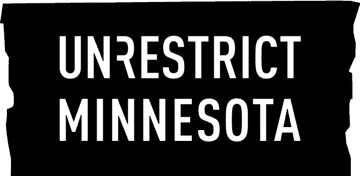As a community-supported public awareness campaign, UnRestrict Minnesota is driven by the solidarity and leadership of its community partners. Together, these advocates, health care providers, lawyers, union members, artists, and concerned citizens are advancing every Minnesotan’s right to access abortion care in our state.
First established as Midwest Health Center For Women-Duluth in 1981, WE Health Clinic has provided sexual, reproductive, and abortion care in northeastern Minnesota for more than 40 years. WE Health Clinic’s mission is to provide, advance, and advocate for evidence-based reproductive and sexual health care for all.
Q&A
In this interview, WE Health Clinic Executive Director Laurie Casey shares more about the clinic’s history, the importance of building equitable reproductive health care access in their region, and WE Health Clinic’s role as a member of the UnRestrict Minnesota coalition.
Could you tell us a little bit about your work?
WE Health Clinic is a reproductive health organization located in northeastern Minnesota. We serve a wide region: from northern Minnesota and northern Wisconsin to the upper peninsula of Michigan and sometimes North Dakota. We have been in existence since 1981, though we’ve had different names in the past. We were first a satellite clinic of Midwest Health Center for Women, down in Minneapolis, from 1981 to 1983. In 1983 we became our own entity, which was Women’s Health Center. We provide abortion care, gynecology, low-cost and free contraceptives, testing for sexually transmitted infections (STI), support from MNSure navigators on staff, and community speaking engagements related to reproductive health. In 2018 and 2019, we expanded our services to include gender-affirming care and PrEP therapy to better serve our community. As the Women’s Health Center, we frequently got calls from people wondering if only women could be seen at our clinic because of the name of the center, so to be more representative of the gender-expansive care that we offer, and to be more inclusive of the populations who we serve, we decided to change our name. In May of 2019, we became WE Health Clinic.
Why is this work important to take on in Minnesota?
We’re located in St. Louis County, and St. Louis County is actually one of the biggest counties in the United States. There are a lot of rural areas, and some of those rural areas don’t have access to good reproductive healthcare. So it’s important for us to be available and accessible to people seeking reproductive health care, including abortion. Most recently, with the overturning of Roe v. Wade, some neighboring states have outlawed abortion, so people can’t access abortion. So we are doing everything we can to be accessible to clients coming from other states who may need reproductive health care and abortion services.
Why did you join the UnRestrict Minnesota coalition?
I thought UnRestrict Minnesota was very brave in suing the state—it was a huge undertaking and their advocacy really aligned with our work at WE Health Clinic. UnRestrict’s work is so important because this coalition is also working to reduce stigma and to show that abortion and reproductive health care should be viewed as part of mainstream medical care, which they are! We wanted to be a part of this organization because as a reproductive health organization, we share these goals. We want to reduce stigma, we want to reduce harassment, and we want to make people feel comfortable accessing reproductive health care. If they want an STI test, if they want an abortion, if they want birth control, there shouldn’t be any shame around seeking those services. So that’s why we joined UnRestrict Minnesota.
What does achieving full reproductive justice in Minnesota mean to you?
Our vision would be that anyone would have access to whatever health care they need, without cost barriers and without judgment. We still see patients that come to our clinic who have had a horrible experience with health care systems—even with their primary care providers—where they’ve faced judgment about their choices. So our vision is one where reproductive health care is not only accepted, but destigmatized. Where people trust what an individual wants, where every person has the dignity of decision-making over their body, and every person can get the care they need. We want accessible, affordable, reproductive health care, where there are no laws restricting someone’s choice.
How can people get engaged with your work?
We are always accepting volunteers. If people want to volunteer, they can just reach out and we’ll set up an interview and figure out what would be a good fit for them. We have in-person fundraisers and events as well, so if people get on our mailing or email list, they’ll get updates about those. We’ve had an outpouring of community support since Roe v. Wade was overturned, which has been amazing: we’ve had numerous applications for clinic staff openings, and we’ve had people really interested in volunteering or donating to our work. So coming to an event, volunteering, donating online to our clinic–those are all great options. And write letters to the editor, or contact your local politicians! Advocacy can play a huge role in supporting our work as well.


